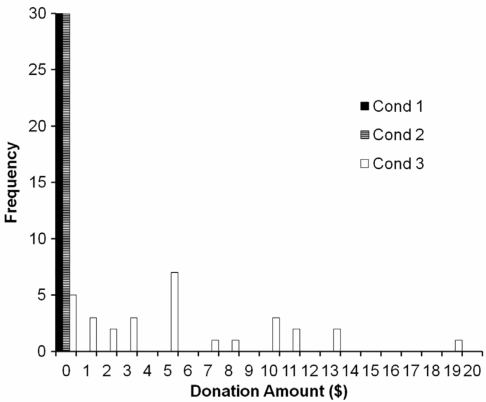Kurzban: Are All Dictator Game Results Artifacts?
 Subscribe to Decision Science News by Email (one email per week, easy unsubscribe)
Subscribe to Decision Science News by Email (one email per week, easy unsubscribe)
DARN THAT IS INTERESTING
Rob Kurzban has an interesting write up of this article on the dictator game here.
ABSTRACT
Economic experiments are increasingly being used in a number of research areas and are a major source of data guiding the debate surrounding the nature of human prosociality. The degree to which experiment behavior accurately reflects external behavior, however, has long been debated. A number of recent studies have revealed just how remarkably sensitive participants are to cues of a lack of anonymity. Similarly, others have suggested that the very structure of the experimental context induces participants to choose prosocial options. In order to truly create anonymous conditions and to eliminate the effects of experimental contexts, participants must not be aware of their participation. Here, I present the results of a natural-field Dictator Game in which participants are presented with a believable endowment and provided an opportunity to divide the endowment with a stranger without knowing that they are taking part in an experiment. No participants gave any portion of the endowment to the stranger. Baseline frequencies of prosocial behaviors exhibited under experimental contexts might therefore be substantially inflated compared to those exhibited under natural contexts.
REFERENCE
Winking, J. and Mizer, N. (in press). Natural-field dictator game shows no altruistic giving. Evolution and Human Behavior.



Kurzban (and your title) gives the article more credit than it deserves. the key difference between the typical DG in the lab and Winking and Mizer’s paper is that it is much more explicite in the lab-DG that the windfall could be shared, because the second party (another person who also showed up for the experiment in the lan) is explicitly introduced. The situation is quite different in Winking and Mizer’s paper, where the other person is either not explicitely introduced, or a random stranger (who did not also show up for an experiment to the lab).
June 8, 2013 @ 3:16 am
I agree with the person posting above. The new experiment is very different, since it effectively requires you to go up to a stranger (who has been engaged on a mobile call, and who is hence unaware of your sudden windfall) and give him some money – and providing the circumstantial explanation yourself.
Going up to strangers in Las Vegas and suddenly giving them money is not a social norm, shall we say. It is likely to be embarrassing, and to arouse suspicion.
June 8, 2013 @ 10:10 am